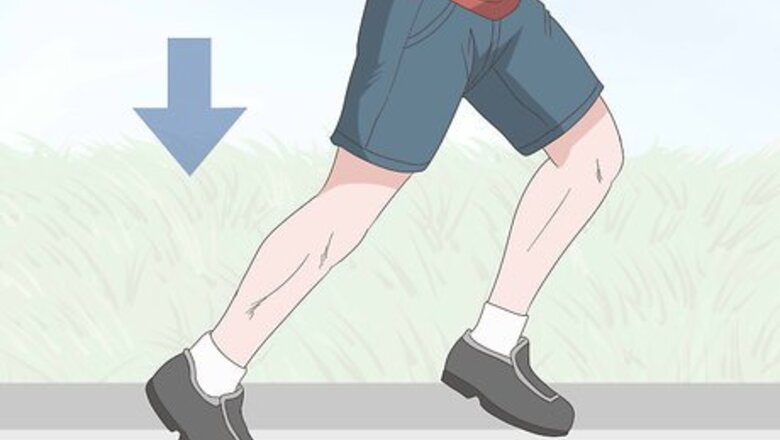
views
Taking Breaks while Running
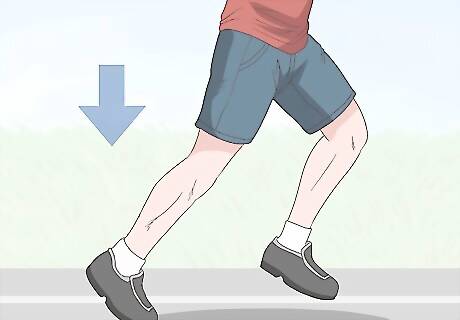
Reduce your pace and running time to prevent making problems worse. One of the easiest ways you can keep a cough from getting worse while running is to reduce both your speed and running time. Taking it a little easier when it comes to your pace ensures that your lungs can handle the additional pressure of the cough. Running for a lower amount of time than you normally would will keep your cough from getting aggravated. To play things safe, cut your running time and pace in half. For example, if you normally run 2 mi (3.2 km) in 30 minutes, consider running 0.5 mi (0.80 km) in 15 minutes.
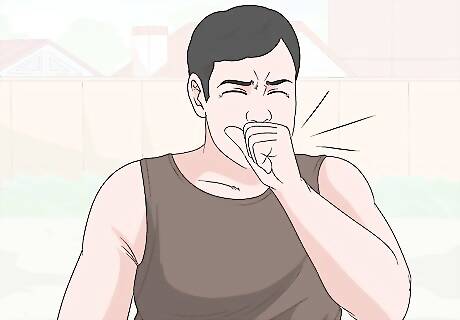
Stop running when you’re coughing to make sure you get enough air. If you start a coughing fit while you’re running, slow down to a walk or stop completely. Allow yourself to cough until you feel like you’re past the irritation. Give yourself 30-45 seconds after you take your break before you start running again. Persistent coughing may be a sign of reactive airway disease or asthma, and up to 30% of people with allergies will develop asthma later in life. If you have a frequent cough when you exercise, ask your primary care provider to evaluate you for asthma.Warning: If you keep running through the cough, you could struggle to get enough air while you’re running. This could lead to nausea or dizziness if your brain can’t get enough oxygen while your heart rate is up.

Practice some pursed breathing if you get short of breath. If you find yourself struggling to breathe, stop running and either stand still or sit on a bench or ledge. Sit or stand up straight and put your hands on your head. Breathe in through your nose and out through your mouth in a calm rhythm. As you blow air out, pucker your lips like you’re whistling. This will empty your lungs of the older air that may be causing some irritation and help your coughing stop. While doing this, try to use your diaphragm instead of your upper chest. Focus on moving the muscle at the bottom of your lungs to push the air at the bottom out.

Clear your lungs with controlled coughs if you feel blockages. If you feel like you have something caught in your throat or sinuses, controlled coughing can help clear your airway. Stop running and sit down on a bench or ledge. Lean forward and fold your arms across your chest. Breathe in through your nose, then lean forward even further while intentionally coughing 2-3 times. Press your arms into your chest while coughing to force any blockages out of your airways. Spit out any mucus or buildup in your throat or lungs instead of swallowing it. It’s better to get rid of it than put it back into your body. Repeat this process as needed until you feel like your lungs, throat, and sinuses are clear. If your phlegm or mucus is green or yellow, your immune system is working really hard to fight an infection. You should strongly consider stopping your run to give your body a break.
Using Medication to Help
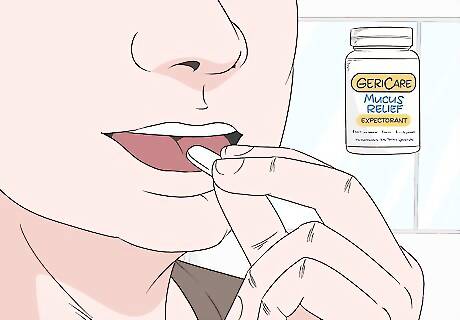
Take an expectorant prior to running to keep your lungs clear. At least 1 hour before running, take an over-the-counter expectorant. Expectorants are a type of medicine that aids in the secretion of mucus in the lungs and airways. As your lungs and throat start secreting mucus, existing blockages will become thinner and it will become easier to cough up and breathe.Warning: Avoid using cough suppressants, especially if you may have a lower respiratory infection. It’s healthy for the lungs to clear themselves by coughing, and keeping yourself from coughing can worsen an infection. If you’re taking guaifenesin, the most popular expectorant, the maximum adult dose in a day is 2400 mg. Do not take more than the daily recommended amount of any over-the-counter medicine.
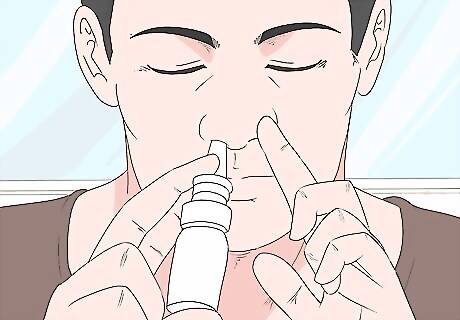
Use a saline spray if your sinuses are irritated. If your cough is tied to symptoms starting in your nasal cavities or sinuses, get an over-the-counter saline spray. At least 30-minutes before your run, blow your nose. Then, tilt your head back and stick the saline spray in a nostril. Squeeze once while inhaling through your nose to send the spray into your sinus. Repeat on the other nostril. Saline spray can feel kind of weird to use if you aren’t familiar with it. If you’re not used to inhaling medicine, it may be uncomfortable, but it will help clear your nose. Saline rinses and sprays can help relieve postnasal drip, which is a common cause of coughing. If the cough persists, talk to your primary care provider about using a nasal steroid.

Suck on a cough lozenge before running to moisturize your throat. To give your throat a decent break before running, get a pack of throat lozenges and suck on one for 20-30 minutes before you plan on running. Throat lozenges are a good way to soothe a cough without actively suppressing one, which can be bad for you if you’ve been coughing quite a bit. This will also moisturize your throat, which will make it easier to run when you start working out. Mentholated lotion may help as well. Simply rub a little bit on your chest and under your nose and you’ll start to feel better.

Try taking a spoonful of honey to treat a cough. Honey can be a great natural way to treat a cough, especially for children who can’t take cough suppressants. Take 1–2 teaspoons (4.9–9.9 ml) of honey before you plan on running to help alleviate your cough symptoms. Never give honey to children under 1 year old since it could cause infant botulism.
Determining When to Take Time off

Take a few days off if you feel like you’re starting to get sick. If you feel like you’re coming down with something heavier than a light cough, you should strongly consider taking 2-3 days off of your typical exercise regimen. Your immune system will be working hard to fight off whatever virus or infection you’re about to experience, and working out or running could keep your body from fighting the illness. Do not run if you’re coughing up green or yellow mucus. These are signs that your immune system is working overtime and you should avoid putting too much strain on it.

Avoid running if your cough is causing lung strain or chest pain. Your cough could be caused by something in your sinus or throat. These coughs are usually fine to run with. If you feel strain or pain in your lungs when you cough though, do not run. Your lungs will struggle to get air as you run and you may cause your body serious harm.Warning: Go to the emergency room immediately if you feel pain in your chest. This could be a sign of a serious problem with your heart.
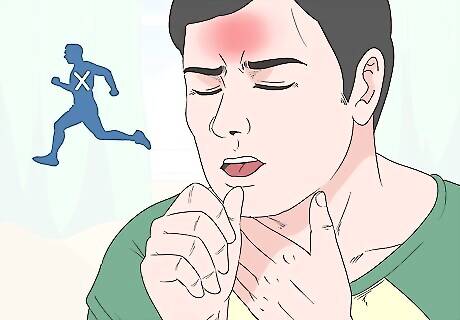
Don’t exercise if you have a hacking cough or fever. If you feel a fever coming on, do not run—your fever will be exacerbated by running and raising your blood pressure. If your cough develops into a hacking cough where your throat feels dry and like it’s burning, you cannot run. Consult a medical professional if a hacking cough or fever doesn’t get better after 1-2 days. In general, any kind of dry cough is probably not good for running. Wet coughs—a cough where mucus or phlegm comes out—may be caused by sinus or throat issues and may be okay for cardiovascular exercise.




















Comments
0 comment